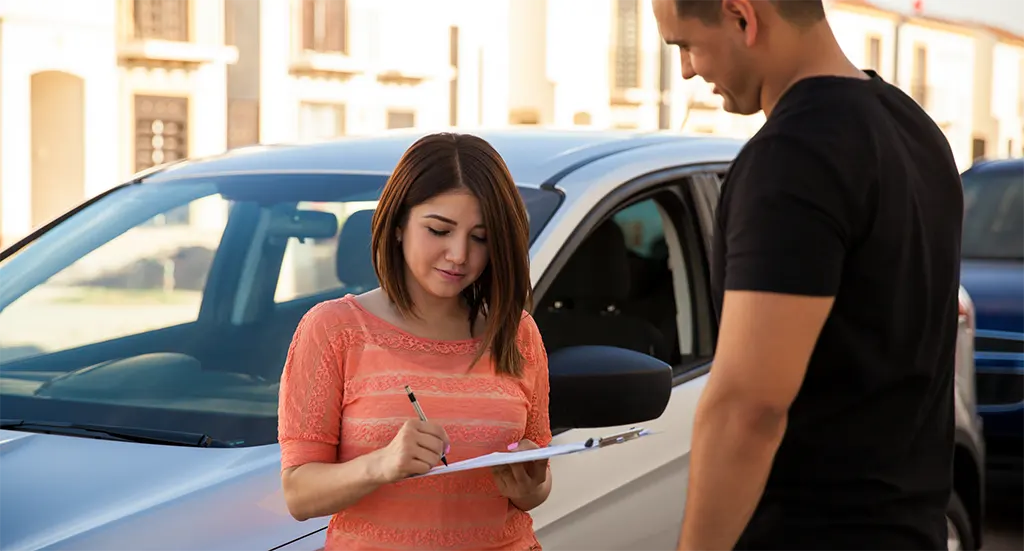UPDATED: April 20, 2022

You’ve scoured the dealer’s lot and found your dream car. It’s perfect, has every feature you want, and you have to have it. When you sit down in the room with the salesperson, they toss you a curve ball. You can buy the car you’ve been looking at, or you could lease that car for less money per month. Sounds great, right? While a lease might look good on paper, there are some hidden costs of a car lease you need to be aware of before you sign.
Table of Contents
What is a Lease?
Before we dive into a car lease’s actual costs, it’s important to distinguish what separates a car lease from a purchase with a car loan.
So, what is a car lease? With a lease, you agree to a term, often 36 months, and agree to use the vehicle and bring it back (likely in exchange for another one) when the term expires.
A car lease is similar to a rental in that you’re agreeing to not damage the vehicle and that you’ll return it with less than a predetermined number of miles driven. The dealership retains ownership of the vehicle, and so they assess specific fees and restrictions to protect their asset.
What Fees Do I Need to Pay to Lease a Car?
While the overall cost of a lease may be less than buying, leases often have a bit of red tape and some fees you may not have considered.
Before you lease, dealers may request payment for any or all of the following:
- Money Down: This is the amount you’ll put down to enable you to drive the vehicle off the lot, just like a down payment on a purchased vehicle. You can find a zero-down lease with specific dealers, but that just means your monthly payments will be a bit higher instead.
- The Money Factor: Vehicles purchased with financing have an agreed-upon APR that reflects the interest to be paid over the life of the loan. Similarly, a leased vehicle comes with a 5-digit money factor in decimal form that’s like an interest rate that accounts for depreciation. If you’re presented with the money factor, you can calculate the equivalent APR by multiplying by 2400. This money factor is sometimes referred to as a lease fee and is directly tied to your credit score. A higher credit score means a lower money factor and vice versa.
- Security Deposit: A deposit may be requested if your credit score falls into the below-average territory. If one is required, make sure you understand the circumstances under which you’d need to forfeit the deposit upon return of the vehicle.
- Taxes & Fees: As with any purchase, you’ll need to consider the cost of taxes and fees in the leased price. Additional fees may include acquisition, disposition, or registration fees. Typically, these costs are not rolled into the lease and need to be paid for out of pocket before leaving the dealership.
When you return, the dealer may surprise you with charges related to:
- Damage: Some lessees mistakenly think that damage will be forgiven if they transition directly into a new lease. But the truth is any damage would either need to be paid, or the cost rolled into your next lease. Read the fine print of the lease related to damage, and be aware of what you’d be expected to pay.
- Mileage: Most leases have mileage requirements, and the lease will outline the cost for any overages. Be wary because these can sometimes be as high as $.25 per mile.
The only surefire way to avoid damage and mileage fees is to purchase the vehicle before your lease is up. If you’ve had a good experience with the vehicle and believe it’s worth it, this can be a viable option.
What if You Can’t Afford the Lease Anymore?
If you find yourself suddenly unable to continue to pay for your leased vehicle due to a job loss or change in financial situation (or you don't have an emergency fund), there are often termination fees to pay. Be sure to read and understand the fine print before you leave the lot in that shiny new lease. Because frequently, the early termination fee puts you on the hook for all remaining payments.
Is it Better to Lease a Vehicle or Buy?
When you consider all of the hidden costs of a car lease, you may be wondering if it’s better to lease or buy a car instead. And that depends on your unique situation. Leasing a vehicle is often beneficial for:
- Drivers who like to trade up into something new every few years. Especially if you like luxury vehicles, it can be cost-efficient to lease a car and exchange it every few years instead of buying and selling, therefore risking loss of value.
- Those who use the car for business. There are tax advantages if you’re using a leased vehicle for business. You might be able to write-off the entire cost of your lease instead of only being able to write off the interest payments if you’d purchased something new.
- People who want a lower monthly payment. Yes, leases often have lower monthly car payments than you’d encounter if you buy. But as we’ve covered in this article, the associated fees can be more financially damaging than the lower payment is worth.
However, buying can be the smart move if you:
- Regularly hit higher than average mileage or travel frequently via car. By design, leases require you to commit to a specific mileage amount annually, often around 10,000-15,000 miles. If you already know you drive far more than that, buying means you won’t need to report yearly mileage to anyone.
- Plan to drive the car into the ground. The beauty of monthly car payments on a purchase is that they eventually end. After that point, all you’re left with are costs related to maintenance and insurance. If you plan to keep your car for several years past the end of payments, it can be a wise financial move to buy.
- Want to take advantage of 0% financing. When dealerships offer deals like 0% financing, it can be a good move for someone who already plans to keep the vehicle for a while.
The Bottom Line
Leasing a vehicle may put you in a nicer car that comes with big promises of ease. But you’ll want to understand the hidden costs of a car lease before you commit. Expenses like the money factor, deposit, fees, damage, and mileage can add up to make leasing a vehicle a significantly more expensive way to get around town.






Leave a Reply